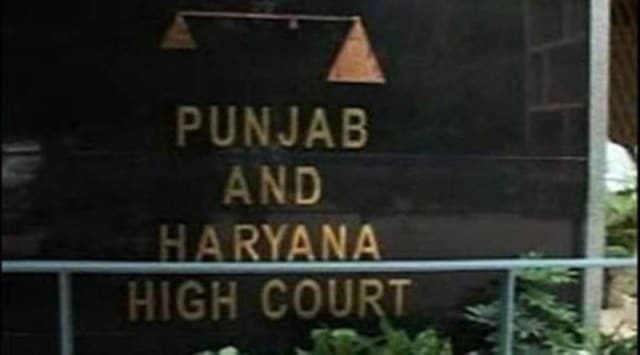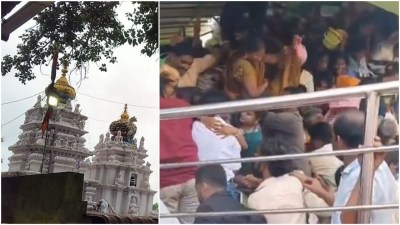Trial courts have no power to impose penalty of life term without remission or parole: HC
The order was pronounced by the high court while hearing the plea.
 The division bench of Chief Justice Ravi Shankar Jha and Justice Arun Palli, has meanwhile issued notice to PU over a petition filed by UIAMS Professor Sanjeev Kumar Sharma for December 9.
The division bench of Chief Justice Ravi Shankar Jha and Justice Arun Palli, has meanwhile issued notice to PU over a petition filed by UIAMS Professor Sanjeev Kumar Sharma for December 9.Citing a judgment of the Supreme Court in the case of V Sriharan (supra), wherein it has been stated that “.the power to impose a modified punishment providing for any specific term of incarceration or till the end of the convict’s life as an alternate to death penalty, can be exercised only by the High Court and the Supreme Court.”, a division bench of the Punjab and Haryana High Court has reiterated that trial courts have no power to impose penalty of lifelong imprisonment without remission or parole.
The division bench of Justices S Muralidhar and Avneesh Jhingan has also directed that a soft copy of this judgment together with that of the Constitution Bench of the Supreme Court in V Sriharan (supra) be circulated by the Chandigarh Judicial Academy through email to all judicial officers as well as jail authorities in the States of Punjab and Haryana and Chandigarh.
The order was pronounced by the high court while hearing the plea of one Savitri, who has challenged the Hisar Divisional Commissioner’s order rejecting her request for parole on the ground that the terms of her imprisonment sentence, imposed by a trial court, did not allow her parole.
Savitri had been sentenced to imprisonment for the whole of her natural life without remission by a trial (ADJ) court of Hisar in 2018 for murder and other offences, on account of her involvement in Baba Rampal’s crimes.
Savitri’s counsel advocate Arjun Sheoran submitted that the trial court could not have while awarding the sentence directed that the petitioner would not be entitled to any remission, and further that her request for temporary release/parole could not have been refused on that ground.
The counsel for Haryana government argued that in terms of rule 4 of the Rules, the petitioner shall be entitled to apply for parole only after completing one year of imprisonment after conviction and has earned her first annual good conduct remission (AGCR) under the Act, and since the sentence awarded by the trial court specifically states that the petitioner should serve life sentence for her entire natural life, without remission, the question of her being eligible for AGCR would not arise and consequently, she would be ineligible to be considered for parole.
Advocate Sheoran argued that a co-convict who was also sentenced on similar terms was allowed parole despite the sentence by SP Jail Ambala.
The HC bench after hearing the arguments held that the Divisional Commissioner who passed the order rejecting the petitioner’s request for parole was, therefore, constrained to apply rule 4 in light of the sentence awarded by the trial court.
Meanwhile, the bench pointed out that whether the trial court could have passed such a sentence would undoubtedly be one of the questions that would arise for consideration in the petitioner’s criminal appeal against her conviction and sentence which is pending before this court.
The HC bench further pointed out that with regard to the power of the trial courts to award sentences with riders has been made explicit in the Constitution Bench judgment of the Supreme Court in the case V Sriharan (supra), as per which, it is not open to a court inferior to the high court and Supreme Court, while awarding a sentence of life imprisonment under the IPC to further provide for any specific term of incarceration, or till the end of a convict’s life, or to direct that there shall be no remission, as an alternate to the death penalty. That power is available only with the high courts and the Supreme Court.
Therefore, in terms of the law explained by the Constitution Bench of the Supreme Court in V. Sriharan (supra), the trial court in its order dated October 16, 2018, awarding the sentence to the petitioner of rigorous imprisonment for life was in error in adding the rider that it would be for the remainder of her natural life and without any remission, held the HC in the order.
The bench thus held that the order dated June 5, 2020, passed by the Divisional Commissioner, Hisar, rejecting the petitioner’s application for parole on the above grounds is legally unsustainable and is hereby, set aside, whereas the petitioner’s application for parole is remitted to the Divisional Commissioner, Hisar, to consider afresh the petitioner’s application for parole in accordance with law.
Meanwhile, another plea of petitioner that Pawan, a convict in the related FIR, has been granted parole, the HC bench stated that it will be taken note of by the Divisional Commissioner while passing an order afresh on the petitioner’s application for parole, and the fresh order be passed not later than August 31, 2020, and communicated to the petitioner forthwith and in any event not later than September 2, 2020.







